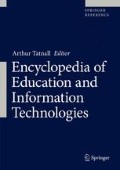Access this chapter
Tax calculation will be finalised at checkout
Purchases are for personal use only
References
AlSadoon H (2017) Students’ perceptions of e-assessment at Saudi electronic university. Turk Online J Educ Technol 16(1):147–153
Ashton H, Beevers C, Bull J (2004) Piloting E-assessment in Scottish schools-building on past experience. Int J E-Learn 3:74–84
Barncord SW, Wanlass RL (1999) Paper or plastic: another ecological consideration in neuropsychological assessment. Appl Neuropsychol 6(2):121–122
Bhatti A, Tubaisahat A, El-Qawasmeh E (2005) Using technology-mediated learning environment to overcome social and cultural limitations in higher education. Issues Inform Sci Inf Technol 2:67–76
Black P, William D (2009) Developing the theory of formative assessment. Assess Eval Account 21(1):5–31
Butler M, Pyzdrowski L, Goodykoontz A, Walker V (2008) The effect of feedback on online quizzes. Int J Technol Math Educ 15(4):132–136
Carless D (2012) Trust and its role in facilitating dialogic feedback. In: Boud D, Molloy E (eds) Feedback in higher and professional education. Routledge, London, pp 90–103
Chen W, Bonk C (2008) The use of weblogs in learning and assessment in Chinese higher education: possibilities and potential problems. Int J E-Learn 7(1):41–65
Chua YP (2012) Effects of computer based testing on test performance and testing motivation. Comput Hum Behav 28:1580–1586
Dermo J (2009) E-assessment and student learning experience: a survey of students’ perceptions of e-assessment. Br J Educ Technol 40(2):203–214
Firmin MW, Genesi DJ (2012) History and implementation of classroom technology. Procedia Soc Behav Sci 93:1603–1617
Fluck A, Pullen D, Harper C (2009) Case study of a computer based examination system. Aust J Educ Technol 25:509–523
Gotlib J, Panczyk M, GeBSKI PIOTR, Zarzeka A, Iwanow L, Dabrowski F, Malczyk M (2015) Comparative analysis of opinion of Warsaw medical university students on electronic examinations and final tests by their participation in this form of knowledge assessment-preliminary report. Polish J Public Health 125(3):153–158
Hirsch L, Weibel C (2003) Statistical evidence that web-based homework helps. Focus 23(2):14
Howard M, LeBlanc D (2002) Writing secure code, 2nd edn. Microsoft Press, Redmond
Jiao H (2015) Enhancing students’ engagement in learning through a formative assessment tool that motivates students to take action on feedback. Aust J Eng Educ 20(1):9–18
Kennewell S, Tanner H, Jones S, Beauchamp G (2008) Analyzing the use of interactive technology to implement interactive teaching. J Comput Assist Learn 24(1):61–73
Landis M (2005) Eight ways to integrate whiteboard into instruction. Media Methods 41:4
Miller T (2009) Formative computer-based assessment in higher education: the effectiveness of feedback in supporting student learning. Assess Eval High Educ 4(2):181–192
Naude KA, Greyling JH, Vogts D (2010) Marking student programs using graph similarity. Comput Educ 54(2):545–561
Neumann DL, Hood H, Neumann MM (2010) An evaluation of computer-based interactive simulations in the assessment of statistical concepts. Int J Technol Math Educ 19(1):17–23
Nirmalakhandan N (2007) Computerized adaptive tutorials to improve and assess problem-solving skills. Comput Educ 49(4):1321–1329
Nix I, Wyllie A (2009) Exploring design features to enhance computer-based assessment: learners’ views on using a confidence-indicator tool and computer-based feedback. Br J Educ Technol 42(1):101–112
OECD (2010) PISA computer based assessment of student skills in science. Retrieved from: http://www.oecd.org/publishing/corrigenda. On 15 Oct 2017
Pachler N, Daly C, Mor Y, Mellar H (2010) Formative e-assessment: practitioner cases. Comput Educ 54:715–721
Perkin G, Beacham NA, Croft AC (2007) Computer assisted assessment of mathematics for undergraduates with specific learning difficulties-issues of inclusion in policy and practice. Int J Technol Math Educ 14(1):1–13
Petrisor M, Marusteri M, Simpalean D, Carasca E, Ghiga D (2016) Medical students’ acceptance of online assessment systems. Acta Media Marisiensis 62(1):30–32
Quesada-Serra V, Rodriguez-Gomez G, Ibarra-Saiz MS (2014) What are we missing? Spanish lecturers’ perceptions of their assessment practices. Innov Educ Teach Int. https://doi.org/10.1080/14703297.2014.930353
Rastgoo A, Namvar Y, Iran A (2010) Assessment approach in virtual learning. Turk Online J Dist Educ 11(1):42–48. ISSN 1302-6488. (online) available at http://tojde.anadolu.edu.tr/yonetim/icerik/makaleler/553-published.pdf
Rodriguez-Gomez G, Quesada-Serra V, Ibarra-Saiz MS (2016) Learning-oriented e-assessment: the effect of a training and guidance programme on lecturers’ perceptions. Assess Eval High Educ 41(1):35–52
Rowe NC (2004) Cheating in online student assessment: Beyond plagiarism. Online J Dist Learn Adm 7(2):30–41. (online) available at http://www.westga.edu/~distance/ojdla/summer72/rowe72.html
Shuttleworth M (2009) Repeated measures design. Experiment resources. Retrieved from: http://www.experiment-resources.com/repeated-measures-design.html. On 22 Oct 2017
Sorensen E (2013) Implementation and student perceptions of e-assessment in a chemical engineering module. Eur J Eng Educ 38(2):172–185
Stodberg U (2012) A research review of e-assessment. Assess Eval High Educ 37(5):591–604
Swiderski F, Snyder W (2004) Threat modeling. Microsoft Press, Redmond
Van der Pol J, Van den Berg BAM, Admiraal WF, Simons RPJ (2008) The nature, reception, and use of online peer feedback in higher education. Computers and Education 51:1804–1817
Vardi MY (2012) Artificial Intelligence: Past and Future. Communication of the ACM 55(1):5
Weippl E (2005) Security in e-learning. In: Bidgoli H (ed) The handbook of information security. Wiley, New York
Weippl E (2007) Dependability in e-assessment. Int J E-Learn 6(2):293–302
Wheeler S (2001) Information and communication technologies and the changing role of the teacher. J Educ Media 26:7–17
Yu CH, Ohlund B (2010) Threats to validity of research design. Retrieved from: http://www.creative-wisdom.com/teaching/WBI/threat.shtml. On 28 Oct 2017
Author information
Authors and Affiliations
Corresponding author
Editor information
Editors and Affiliations
Section Editor information
Rights and permissions
Copyright information
© 2020 Springer Nature Switzerland AG
About this entry
Cite this entry
Abdel-Hameed, F.S.M. (2020). Information Technology and Assessment. In: Tatnall, A. (eds) Encyclopedia of Education and Information Technologies. Springer, Cham. https://doi.org/10.1007/978-3-030-10576-1_47
Download citation
DOI: https://doi.org/10.1007/978-3-030-10576-1_47
Published:
Publisher Name: Springer, Cham
Print ISBN: 978-3-030-10575-4
Online ISBN: 978-3-030-10576-1
eBook Packages: Computer ScienceReference Module Computer Science and Engineering

